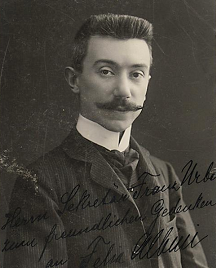Srećko Albini
Srećko Albini | |
|---|---|
 | |
| Born | 10 December 1869 |
| Died | 18 April 1933 (aged 63) |
| Other names | Felix Albini |
| Occupation |
|
Srećko (Felix) Albini (10 December 1869 – 18 April 1933) was a Croatian composer, conductor, and music publisher. He was primarily known for his operettas, some of which were adapted into English and performed in London and New York.
Life and career[]
Albini was born in Županja. He trained in music in Vienna and in Graz, but at the wishes of his family also graduated from a business college. His first engagement as a conductor was for the municipal theatres in Graz, where he worked from 1893 to 1895. He then became a conductor at the Croatian National Theatre in Zagreb, where he remained for the next eight years[1] and composed his first stage work, the three-act opera Maričon. Set to a libretto by , it had a nationalistic theme and incorporated traditional Croatian folk music and dances. Maričon premiered at the Croatian National Theatre in 1901 and received a very favourable review from Die Musik.[1][2][3]
The National Theatre's resident opera company suspended its activities between 1903 and 1909, and Albini moved to Vienna, where he continued composing and conducting. He returned to the National Theatre in 1909, serving there as both a conductor and a stage director until 1919. However, he had ceased his activities as a composer after 1909. Albini went on to become a music publisher and also founded and ran the Croatian Copyright Centre. He died in Zagreb at the age of 63.[1]
Works[]
According to the Croatian musicologist Ivan Zivanović, Albini's music combined "an exuberant melodic invention and skillful sense of drama [that] transcended the musical and dramatic limitations characteristic of operetta of his time."[1] Albini's operettas include:
- Der Nabob, operetta in 3 acts, libretto by Leopold Krenn; premiered at the Carltheater, Vienna, 1905
- Madame Troubadour, vaudeville-operetta in 3 acts, libretto by Béla Jenbach and Robert Pohl; premiered at the Croatian National Theatre, Zagreb, 1907[a]
- Baron Trenck, comic operetta in 3 acts, libretto by Alfred Maria Willner and Robert Bodanzky; premiered at the Altes Stadttheater, Leipzig, 1908[b]
- Die Barfußtänzerin, operetta in 2 acts, libretto by Béla Jenbach; premiered at the Altes Stadttheater, Leipzig, 1909[c]
- Die kleine Baronesse, operetta in 1 act, libretto by Robert Bodanzky; premiered at the , Vienna, 1909
Notes[]
- ^ Also ran for 80 performances in 1910 at Nazimova's 39th Street Theatre in New York in an English adaptation by Joseph W. Herbert[4]
- ^ Also performed in an English adaptation by Frederick Franklin Schrader and Henry Blossom at London's Whitney Theatre in 1911 and New York's Casino Theatre in 1912[5]
- ^ Also performed in Italian as La danzatrice scalza at Teatro La Fenice in Venice in 1921[6]
References[]
- ^ Jump up to: a b c d Zivanović, Ivan (2001). "Albini, Srećko (Felix)". Grove Music Online. Retrieved 23 March 2020 (subscription required for full access)
- ^ Gänzl, Kurt (1994). "Albini, Felix". The Encyclopedia of the Musical Theatre, Vol. 1, p. 17. Schirmer Books. ISBN 0028714458
- ^ Schulz, Ernst (January 1902). "Oper". Die Musik, pp. 623–624 (in German)
- ^ Mantle, Robert Burns and Sherwood, Garrison P. (1943). The Best Plays of 1909–1919, p. 427. Dodd Mead.
- ^ Wearing, J. P. (2013). The London Stage 1910-1919, p. 197 (electronic edition). Scarecrow Press. ISBN 0810893002
- ^ Casaglia, Gherardo (2005). "Felix Albini". Almanacco Amadeus. Retrieved 24 March 2020 (in Italian).
External links[]
- 1869 births
- 1933 deaths
- Croatian classical composers
- Croatian musical theatre composers
- Operetta composers